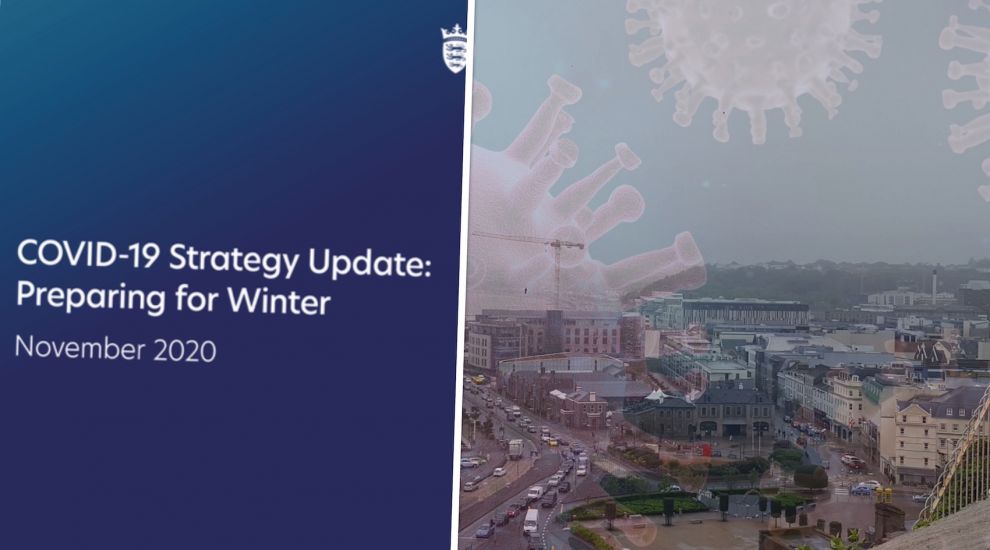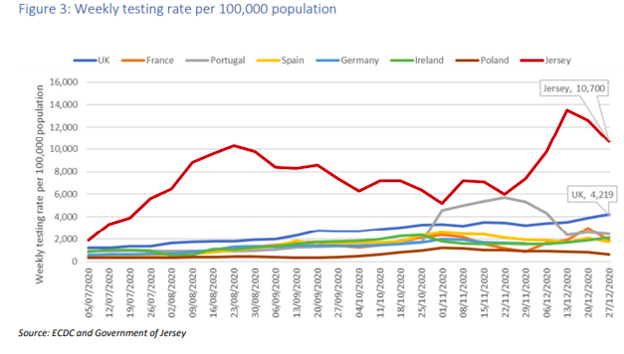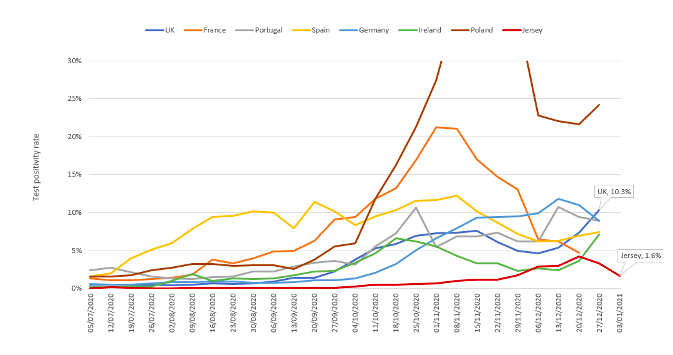


Back in early November, the Government published its Winter Strategy for dealing with the pandemic, which was specifically intended to keep case numbers low, and minimise its effect on islanders' lives.
But by December, the number of active cases had topped 1,000, pubs, cafés, restaurants, gyms and 'non-essential' shops were all closed, islanders were being told to stay at home for work, multiple cases had emerged in care homes and the number of deaths linked with covid-19 had started to increase.
Here, Express took a look at how far the strategy compared to reality...
Containing the virus
The Government published its Winter Strategy in early November as an update to the Covid-19 Strategy that had been released in June.
In the 21-page document, the Government stated its main objective was to "keep covid-19 rates low while minimising impact on life and work" and to "contain how and where the virus is being transmitted and, if possible, not quarantine society as a whole."
The Health Minister noted how this goal had been achieved over the summer and early autumn, with low infection rates and “good” levels of freedom for travel, work and daily life.

Pictured: The number of active cases in the island reached 1,019 on 21 December.
But, despite this aim to keep cases at "low" levels (though no number was ever officially provided), as the island neared winter, the number of cases identified daily kept growing and growing until they reached 1,019 and came very close to fulfilling the 'worst-case scenario' total of 1,100 active cases by Boxing Day, set out by the Deputy Medical Officer of Health, Dr Ivan Muscat in early December.
At the time, most islanders were working from home, all hospitality and fitness venues were closed and the island was days away from all non-essential shops being shut - a situation that continues to this day.
The strategy made several references to the potential risk of increased infection levels over winter. The document noted case rates had increased “sharply” in the UK, France, Spain and other countries in the weeks before the strategy was released.
The strategy also mentioned that even though traveller numbers would go down, the Government expected the “positivity rate” to increase.
“For these reasons, islanders are at greater risk of contracting covid-19 in autumn and winter than has been the case over the summer.”

Pictured: The Winter Strategy stated the only “failsafe” policy would be border closure.
It also went on to note that the only “failsafe” policy would be border closure - yet enhanced border testing only came in mid-November when there were 162 active cases and 1,600 islanders having to isolate.
The increase in cases, which included a sharp rise in care homes despite clear objectives to protect the most vulnerable, happened despite the strategy highlighting that “a key early warning for escalation will be patterns of cases which may include unlinked cases."
One such example of an 'unlinked' case was picked up in mid-October.
Christmas
The strategy appears to strike an optimistic note, suggesting that festive celebrations like church services, Christmas lights 'switch ons', carol singing and school events would be able to go ahead with "special advice and arrangements." They noted that a Government "task group" had been set up to provide advice to event organisers.
"Our aim is to enable as many events to proceed as is safe, depending on the public health risks as assessed at the time," the strategy reads.
In the end, none of the staple Christmas events in the island's calendar were able to go ahead. The annual lights 'switch on' went ahead in a virtual way, and such was the level of concern about case numbers that Deputy Louise Doublet abandoned a bid to allow schoolchildren to sing together again in the run-up.
Restrictions were imposed allowing only 10 people from different households to gather at any one time outdoors - provided they keep a 2m distance between them -and islanders were only allowed to meet indoors on two occasions: Christmas Day and Boxing Day. This led to upset among the island's Polish, Portuguese and Romanian communities, for whom celebrations are traditionally held on Christmas Eve.
“Islanders will need to be accustomed to the Government acting quickly and robustly on this basis, to prevent the need for more restrictive measures affecting travel, the economy, wellbeing and daily living. Although it will be preferable not to impose further Island-wide or universal restrictions, the risk of such measures being required will be greater over the autumn and winter period,” STAC recommended.
Many have argued that the Government waited too long to act. The Chief Minister, Senator John Le Fondré, however, rejected those accusations.

Pictured: All hospitality venues have been closed since 2 December.
Yet, lockdown-lite, which saw the closure of all hospitality and fitness venues, was introduced 10 days into a steady increase in the number of cases. In the days that followed, the daily number of cases averaged more than 60 a day.
The Scientific and Technical Advisory Cell (STAC) advised compulsory mask wearing in shops “with effect from October 2020”, but it came into effect two months later. According to the Chief Minister, it was all to do with law drafting issues and he and the Health Minister very much supported the implementation earlier.
The justification raised some eyebrows with the island’s Chief Scrutineer, Senator Kristina Moore, replying the work could have been done earlier if the advice from STAC had been “properly implemented”.
Pictured: The Government rejected the view that they hadn't acted quickly enough.
Contacted by Express, the Government shared a statement, signed off by the Chief Minister and Health Minister, which highlighted Jersey's "well-resourced and highly effective test and trace capability which has worked well in containing the virus within clusters."
The statement also reiterates the argument that Jersey is testing and tracing "more than three times as many cases as the UK", and is therefore finding more positive cases.
The Government rejected the view that they hadn't acted quickly enough, arguing instead they "responded exceptionally quickly to new information, especially any increases in case rates".

Pictured: The Government says more positive cases are found because of the high level of testing.
"Since publication of the Winter Strategy in November, which anticipated increasing cases, more than 20 different policy measures were introduced in rapid succession, including gatherings orders, mask wearing, testing programmes, increases in operational capacity, distancing and the circuit break arrangements," they added.
"The outcome has been clear: case rates are dropping and we have not had to resort to the type of lockdown measures currently being implemented in the UK and other jurisdictions.
"When making decisions about appropriate covid measures, we are always looking for the right balance between safeguarding public health and enabling as much of normal life to continue as possible, bearing in mind the impact of restrictions on personal health, job security and our economy."
Turning to cases in the care homes, the Government didn't offer any explanation as to how the virus reached vulnerable people but assured they were bringing the clusters "under control" and that residents were receiving their second vaccine jab.

Pictured: Clusters in care homes are being brought under control, the Government assured.
"Our priority has been to keep schools open, achieve a semblance of normality for children and to continue their education," the Government said. "This also allows their parents to work. Compared to the UK and France, our Winter Strategy has allowed a relatively high level of personal freedom, even throughout the current circuit break arrangements.
"Families and friends were able to gather at Christmas, and current case rates mean we can now look forward to exiting the current restrictions with confidence."
The Government added that the number of positive cases identified as a percentage of the total number of tests performed - the positivity rate - had consistently been low or lower than most other neighbouring jurisdictions.

Pictured: The positivity rate - the number of positive cases identified as a percentage of the total number of tests performed - has remained low in Jersey.
"This supports all of the points above: namely, that we are acting on a timely and pro-active basis," they said. "The important factor with the high volume of tests that we are performing, and therefore the high number of positive cases that we are identifying, is that we are catching those positive cases early, and requiring them to self-isolate.
"In many other jurisdictions they are not testing to this level and are therefore not detecting these ‘extra’ positive cases, who will therefore continue to circulate without realising that they are spreading the virus."
"To be clear, we cannot be complacent, and it is possible that there will be an increase from Christmas / New Year, the Government concluded its statement. "That will only become clear over the next two weeks, and that is why we need Islanders to continue to act responsibly, in particular as we are now ramping up the roll-out of the vaccine."
Comments
Comments on this story express the views of the commentator only, not Bailiwick Publishing. We are unable to guarantee the accuracy of any of those comments.